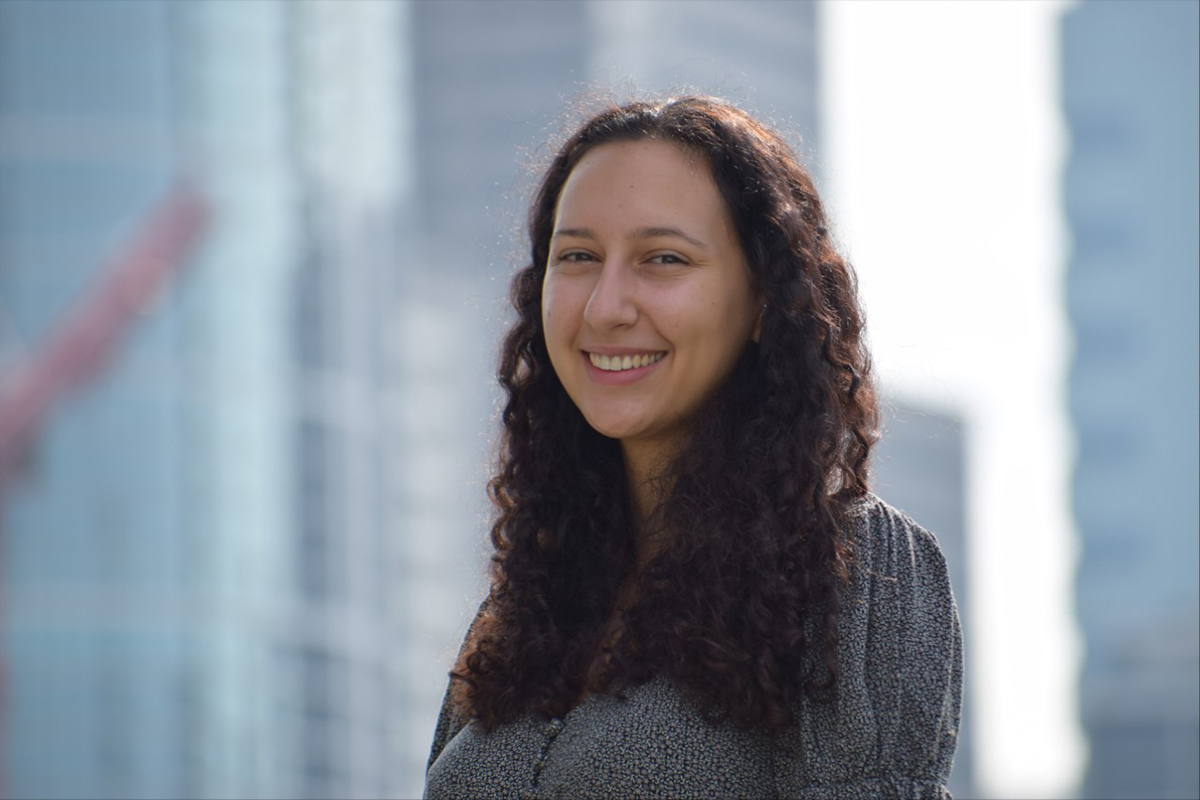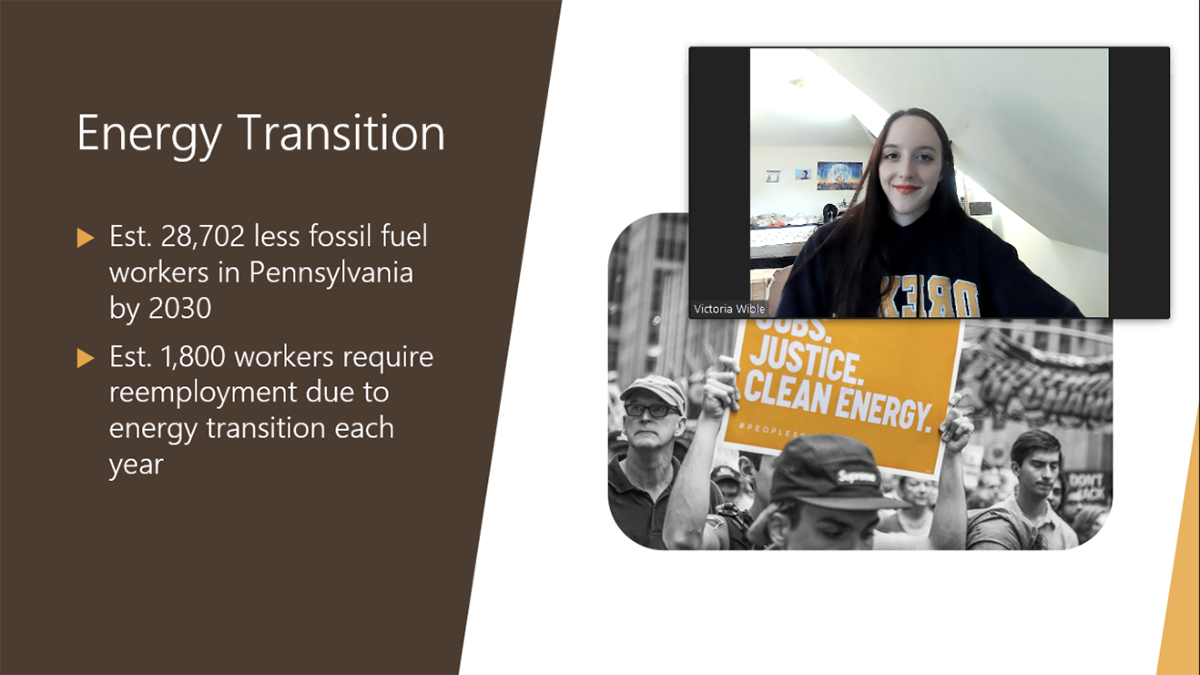Students Share Co-op Experiences in the College of Arts and Sciences
By Christina Papadopoulos '23
 Tetyana Yevdosyuk, a psychology major with a minor in public health, is completing her co-op as a research assistant at the Forman Lab in the WELL Center.
Tetyana Yevdosyuk, a psychology major with a minor in public health, is completing her co-op as a research assistant at the Forman Lab in the WELL Center.
August 31, 2021
As another spring/summer co-op cycle draws to a close, a variety of students are completing their six months of work experience in a position with faculty and staff members from the College of Arts and Sciences. From research assistants in marine conservation ecology and the history of medicine, to marketing writers and Arabic translators — the college offered 51 positions for students to pursue, investing $425,000 in their co-ops. With funding sourced from research grants and startup money, Steinbright Career Development Center also contributed $50,000 in matched funds.
Two students shared a glimpse of what their work experiences looked like, discussing the balance between work, life and school, as well as their excitement for the future having completed co-ops in roles directly related to their academic interests.
Victoria Wible: Sociology '22
With a desire to impact people and society, sociology senior Victoria Wible spent her co-op in the College of Arts and Sciences’ Sociology department working with Research Fellow Arielle Hesse, PhD, and Interim Dean Kelly Joyce, PhD. From conducting hours of policy analysis, to attending the American Sociological Association Annual Meeting over Zoom, to coding over 100 interviews with union members — Wible has been fully immersed into the universe of what it means to be a sociologist.
Though she didn’t start there. Wible explored a variety of academia before landing on sociology, initially entering Drexel as a criminology major, then switching to accounting during her second year. She yearned to focus her studies on something more humanitarian, hoping to have a wider understanding of society and the way it functions.
“I needed something that was a mixture of critical thinking and real-world impact, both of which sociology offers,” Wible explains. “I’ve taken classes where I’ve only looked at the theoretical groundwork of sociology, and I’ve taken classes where I’ve conducted my own research and designed my own projects. I enjoy sociology because it interacts with so many disciplines — history, medicine, science, gender studies — and enables well-rounded thinking.”
 Sociology major Victoria Wible presents research she conducted during her co-op.
Sociology major Victoria Wible presents research she conducted during her co-op.
In her role with the sociology department, Wible presented her research twice — once at the Mid-Atlantic Undergraduate Conference, and another at a student showcase at the University. She’s also gotten the opportunity to write a policy paper with her supervisor, Dr. Hesse, and is currently creating maps demonstrating racial and economic trends within the Philadelphia region.
“I think the most rewarding part of my co-op has been reflecting on all the work I’ve done and recognizing the skills I’ve developed,” describes Wible. “Dr. Hesse and Dr. Joyce have made my personal interests a priority throughout my research and let me explore topics I’m passionate about.”
As the rest of Wible’s co-op winds down, she will be virtually spreading the policy paper she worked on around Philadelphia to target organizations with the help of Dr. Joyce.
“My co-op was entirely remote, but that didn’t take away from the quality of the experiences I had,” Wible says. She notes that a lot of her work required the use of a computer and software, so the virtual setting felt natural. “I had Zoom meetings every day, and my supervisors were so amazing and super accessible.”
Overall, Wible feels lucky to have worked with professionals so ardent about their research focuses and the art of being a sociologist. Though this is her only co-op experience in the 4 year, 1 co-op program, she feels enthusiastic about her future in research, knowing she is well-equipped with the proper exposure to take her where she wants to go.
Tetyana Yevdosyuk: Psychology '22
As a psychology major with a minor in public health, Tetyana Yevdosyuk enters her final year at Drexel after completing a co-op as a research assistant at the Forman Lab with the WELL Center. She began her work last fall, first as a volunteer, then as a work study student. These opportunities allowed her to be exposed to the proper training and expertise necessary for this position, opening the door to her current co-op role as a research assistant. Having previous experience with the WELL Center meant expanding her knowledge and responsibilities beyond what she would have been able to do in another co-op position.
As a full-time, paid co-op, Yevdosyuk has gotten to work on a variety of projects with the WELL Center. Most prominently, she contributes to Project Activate, a large NIH-funded study focusing on the effectiveness of different components of the current gold-standard behavioral treatment for weight loss. In this position, she’s been able to screen potential participants to determine their eligibility for studies, and conduct assessments at various study points via Zoom. Yevdosyuk is in charge of editing and adjusting the 8-condition handouts given to participants, as well as monitoring weight, MyFitnessPal, EMA and Fitbit data.
Additionally, Yevdosyuk has been able to create her own research study through the WELL Center. Working independently to develop her own research questions and hypotheses, Yevdosyuk’s study will measure the feasibility and acceptability of the meditation component of the awareness condition groups, a part of Project Activate. Her survey will be administered to participants during their mid-treatment assessment in the fall.
“I had the opportunity to write my very first research abstract with the help of Dr. Evan Forman and one of his graduate students, Becca Crochiere,” notes Yevdosyuk. After establishing close working relationships during this position, both Dr. Forman and Crochiere are now assisting Yevdosyuk as her senior thesis mentors. “I presented [my research abstract] at the Week of Undergraduate Excellence virtual poster session, as well as the 4th annual Undergraduate Psychology Symposium. I am so thankful for all the opportunities I have taken part in through my journey with the WELL Center.”
Yevdosyuk has also worked on Project REBOOT at the Manasse Lab, studying novel computerized treatment for binge eating disorder and bulimia nervosa. This study combines CBT with an at-home computer program, and has allowed her to work remotely with tasks like data entry, data organization and labeling, and scoring data in R.
“Co-op has definitely affected my plans for the future. My first co-op with the Penn Vet Working Dog Center helped me realize I was more interested in working with people than animals, while my second co-op with the WELL Center helped me consider the possibility of clinical psychology as my future career path, which I previously eliminated,” Yevdosyuk explains. “The extensive and detailed career development has taught me so much about what future research will look like for me. I have learned so much about the graduate school application process, the requirements for getting in and insider tips on how to get there.”
Of course, it did not come without challenges. With the nature of a remote position, Yevdosyuk notes it was difficult to not have full face-to-face interaction on a daily basis, especially when navigating new responsibilities. Through resilience she built during the COVID-19 pandemic, she was able to figure out what worked best for her in terms of time management and task prioritization, and thus more smoothly transition from part-time to full-time work while working out of her bedroom every day.
“This co-op has been my favorite. It’s allowed me to see concretely what a future in clinical psychology will look like, and I can now envision what my own research will look like,” says Yevdosyuk. “Combining the skills I’ve acquired with the field-specific career advice I’ve received, I am confident that I’m equipped for professional life after graduation. I cannot wait for the journey ahead!”